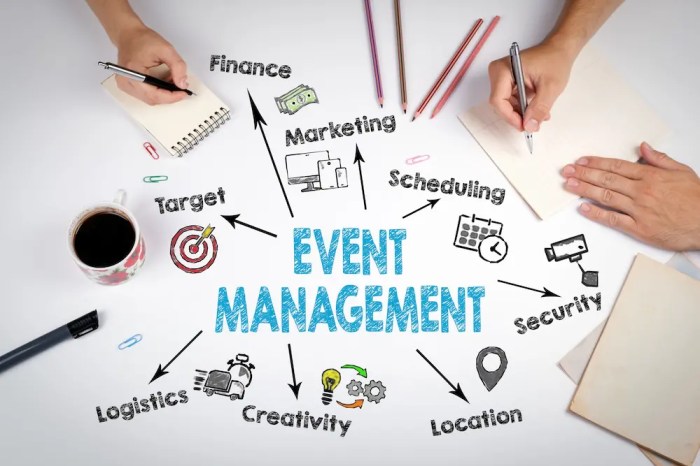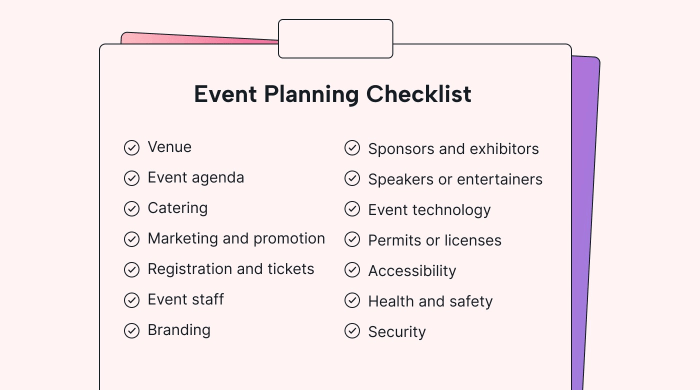Event Planning Tips: Ready to elevate your event planning game to the next level? Get ready to dive into the world of meticulous planning, creative strategies, and flawless execution with this ultimate guide.
Whether you’re a seasoned event organizer or a newbie looking to make a mark, these tips will equip you with the knowledge and insights needed to host unforgettable events that leave a lasting impression.
Importance of Event Planning: Event Planning Tips
Event planning is a crucial aspect of organizing successful events. It involves detailed preparation, coordination, and execution to ensure that everything runs smoothly and according to plan. Effective event planning can have a positive impact on the outcome of an event in various ways.
Ensuring Smooth Execution, Event Planning Tips
- By meticulously planning every aspect of an event, organizers can anticipate and address potential issues before they arise, ensuring that the event runs smoothly from start to finish.
- Proper event planning involves creating a detailed timeline, coordinating with vendors and suppliers, and communicating effectively with all parties involved.
- When everything is well-planned and organized, attendees can enjoy a seamless and enjoyable experience, leading to a positive overall impression of the event.
Creating Memorable Experiences
- Effective event planning allows organizers to create unique and memorable experiences for attendees, making the event stand out from others in the same industry.
- From creative themes and engaging activities to personalized touches and attention to detail, meticulous event planning can leave a lasting impression on attendees.
- By focusing on creating memorable experiences, organizers can increase attendee satisfaction and loyalty, leading to higher attendance rates and positive word-of-mouth marketing.
Maximizing Return on Investment
- Well-planned events are more likely to meet their objectives and deliver a positive return on investment for organizers.
- By setting clear goals, tracking key performance indicators, and evaluating the success of an event, organizers can measure the impact of their planning efforts and make informed decisions for future events.
- Effective event planning can help organizers optimize resources, minimize costs, and maximize the overall impact and success of an event, benefiting both organizers and attendees alike.
Initial Event Planning Steps

When starting to plan an event, there are crucial initial steps that need to be taken to ensure a successful outcome. Setting clear objectives and goals, establishing a budget, and creating a timeline are essential components of the early planning stages.
Setting Clear Objectives and Goals
- Define the purpose of the event and what you hope to achieve.
- Create specific and measurable goals to track progress and success.
- Identify the target audience and tailor the event to meet their needs and expectations.
- Artikel key deliverables and outcomes to guide the planning process.
Establishing a Budget and Timeline
- Determine the financial resources available and allocate funds accordingly.
- Create a detailed budget that includes all expenses and revenue sources.
- Set deadlines and milestones to keep the planning process on track.
- Consider factors such as venue costs, catering, entertainment, and marketing expenses.
Selecting the Right Venue

When it comes to choosing the perfect venue for an event, there are several key factors to consider. From location to capacity, each detail plays a crucial role in ensuring the success of your event.
Factors to Consider
- Location: The venue should be easily accessible for all attendees, whether it’s a local event or a destination gathering.
- Capacity: Make sure the venue can comfortably accommodate the number of guests you expect to attend.
- Amenities: Consider what amenities the venue offers, such as parking, catering options, and audiovisual equipment.
- Cost: Stay within your budget while also considering the value that the venue provides for the price.
- Layout: The layout of the venue should align with the flow of your event, whether it’s a conference, gala, or wedding.
Aligning with Event Theme
When selecting a venue, it’s important to ensure that the space aligns with the theme or purpose of your event. Whether you’re aiming for a formal atmosphere or a more casual setting, the venue’s ambiance should complement the overall vibe you want to create.
Importance of Visiting in Person
Seeing is believing
Visiting the venue in person is crucial before making a final decision. This allows you to get a feel for the space, envision how your event will unfold, and address any potential concerns or logistics that may arise. Plus, it gives you the opportunity to ask questions and ensure that the venue meets all your requirements.
Event Logistics and Coordination
When it comes to event planning, handling logistics and coordinating various aspects of the event are crucial for its success. This involves managing details like catering, audiovisual setup, and transportation, among other important factors.
Key Logistics Involved
- Catering: Selecting the right menu and ensuring food is prepared and served on time.
- Audiovisual Setup: Setting up sound systems, screens, and lighting for presentations or entertainment.
- Transportation: Organizing transportation for guests, speakers, and other participants to and from the venue.
Effective Communication and Coordination
- Team Members: Keeping all team members informed and on the same page regarding their responsibilities and tasks.
- Vendors: Communicating clearly with vendors to ensure they understand requirements and deliver as expected.
- Timely Updates: Providing regular updates and status reports to everyone involved in the event planning process.
Creating Detailed Timelines and Schedules
- Start Early: Begin planning and creating timelines well in advance to account for any unforeseen issues.
- Break Down Tasks: Divide the event preparation into smaller tasks with deadlines to ensure everything gets done on time.
- Include Buffer Time: Factor in extra time for each task to accommodate delays or last-minute changes.
Managing Event Risks
Planning an event involves more than just choosing the right venue and coordinating logistics. It’s crucial to also consider potential risks that can arise during the event and have strategies in place to mitigate them. By identifying risks early on and planning for unexpected circumstances, event planners can ensure a successful and smooth event execution.
Identifying Potential Risks
Before diving into event planning, it’s essential to identify potential risks that can impact the event. These risks can range from technical issues with AV equipment to weather-related disruptions or even sudden cancellations from key speakers or performers.
Importance of Contingency Plans
Having contingency plans in place is crucial for handling unforeseen circumstances that may arise during the event. These plans act as a safety net, allowing event organizers to address issues quickly and effectively without causing major disruptions to the event flow.
Risk Management Strategies
- Developing a detailed risk management plan that Artikels potential risks and corresponding mitigation strategies.
- Securing event insurance to protect against financial losses due to unforeseen circumstances.
- Creating backup plans for key elements of the event, such as alternative indoor venues in case of inclement weather.
- Regularly communicating with vendors, suppliers, and stakeholders to ensure everyone is aligned on risk management protocols.
- Conducting thorough rehearsals and run-throughs to identify and address any potential issues before the event.